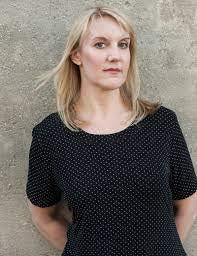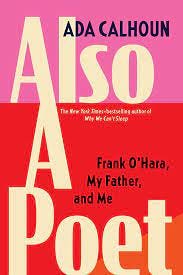“They were: British, superhuman, generous, gay, Christian.]”
Ina Garten once said that if something you’re making for a dinner party goes disastrously wrong, you should walk into the living room (where your guests are, presumably, chatting wittily while drinking artisanal cocktails), clap your hands, and say, “Well, it looks like we’re ordering pizza.”
A writer, finding herself standing over the literary equivalent of a cindered chicken, has no such easy out. She can continue to poke at the doomed manuscript, in the hopes of a miraculous resuscitation. She can abandon the project, hoping that none of her friends have the bad manners to ask after that multipart epic she’d been telling them to expect. Or (and this is the riskiest, though often the most rewarding, choice) she can place the cinder squarely on the plate, surround it with interesting bits of foliage, and carry it out to the dining room.
Ada Calhoun’s Also a Poet is a lump of cinder on a plate — and it’s also the best memoir I’ve read in ages. Calhoun’s intention, setting out, was to write a critical biography of the poet Frank O’Hara. Her father, the art critic Peter Schjeldahl, had tried and failed to write a book about O’Hara when Calhoun was a baby. And now, decades later, armed with her father’s recorded interviews and her own pluck and competence, Calhoun will finish the job.
But Calhoun’s book — like her father’s — ends up crashing on the shoals of O’Hara’s sister Maureen, who manages her brother’s estate with capricious stinginess. And thank God that she does. Because instead of a biography of O’Hara — snoozing beneath its high-toned accolades on bookstore display tables — we get a delightful and vital amalgam: part memoir of Calhoun’s East Village childhood, part appreciation of O’Hara, part meditation on the hilariously persistent deficiencies of Calhoun’s father (“he’s never seemed particularly interested in me,”) part anguished reflection on whether she’d be better off if those deficiencies had passed on to her. It’s sad and funny and, above all, interesting.
My favorite bit is when Calhoun, who to that point has been quietly confident that her professionalism will win over O’Hara’s hesitant sister, discovers that it will not. After months of careful courtship (Calhoun has been planning to visit Maureen in Connecticut) Maureen calls.
“This is it! I thought when I saw her name come up on my phone. It’s all happening!”
But Maureen isn’t, it turns out, calling to plan a rendezvous. She’s calling to take a flamethrower to Calhoun’s meal-in-progress.
For page after page Maureen rants about the ill-conceived-ness and impropriety of Calhoun’s project, and for page after page Calhoun nods in horrified disbelief. At one point Maureen, in a rich lather of indignation, takes issue with the way that Calhoun, in an earlier book, described the poet W.H. Auden. “Why would you use those adjectives about him?” Maureen asks plaintively. After which Calhoun inserts my favorite passage in the book:
“[Later, I looked up the adjectives I used for Auden. They were: British, superhuman, generous, gay, Christian.]”
I love, first of all, the florid wrongness of Maureen, so calmly and compactly displayed. And I love too that colon after They were — it’s the grammatical equivalent of the moment, deep in an argument, in which you (ever so humbly) clear your throat before reading out the passage that will prove you to have been indisputably right all along.
But what I love most about the passage are the brackets — what an underused delight brackets are! Parentheses pull you into the wings of the theater for a brief and conspiratorial whisper. Brackets carry you out of the theater entirely — they take you across the street for a drink at which they will tell you about the director’s collapsing marriage and the production’s dodgy finances.
Calhoun is, throughout Also a Poet, a candid and intimate presence. But we are never closer to her essential self than in this fastidious, incredulous, imperceptibly smiling aside. And it comes at the moment when her book, which is not only a book but a means of repairing her relationship with her father, is falling apart! How disastrous. How delicious.




My goodness! I’d pay for some decent brackets. Maybe even a second round. I’ll be looking for Ms. Calhoun’s ashy offering.